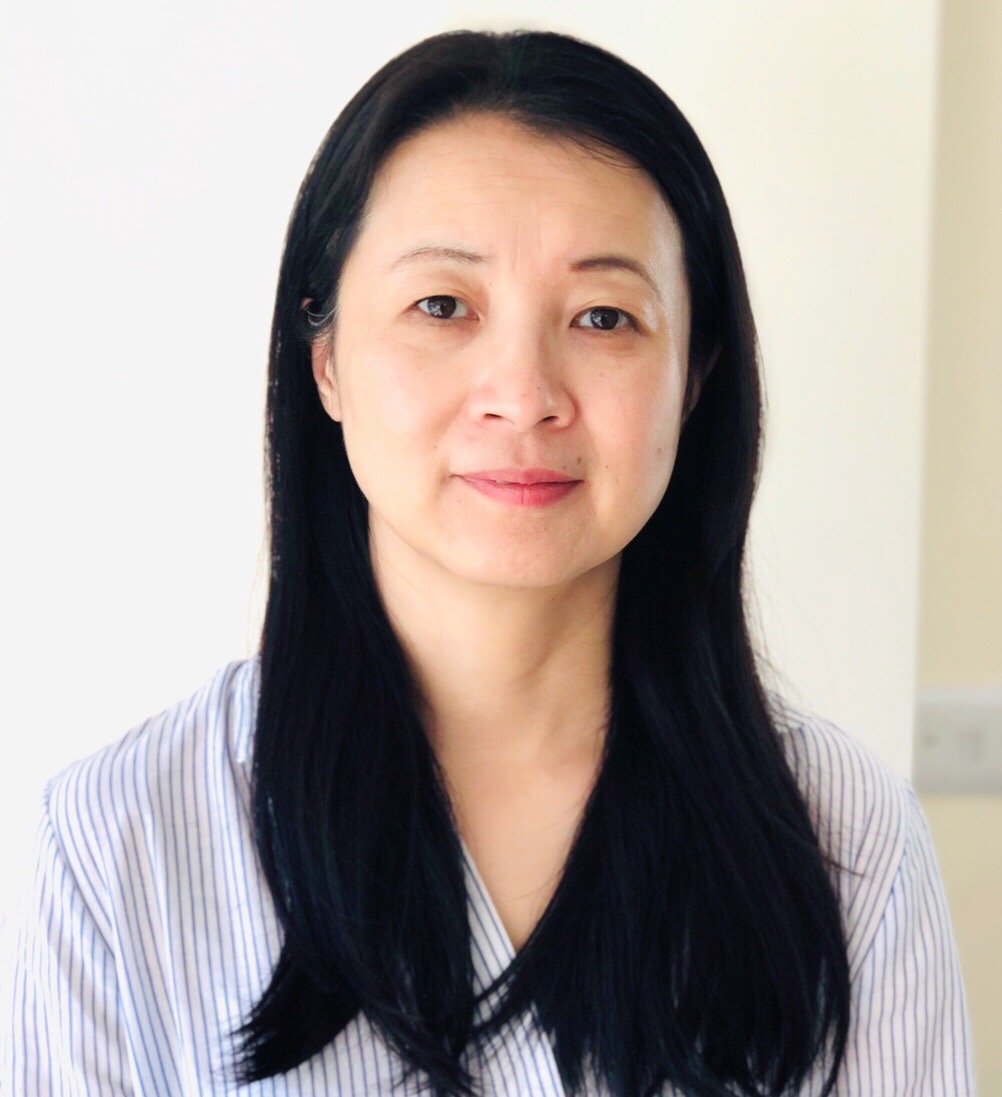Esteemed Speakers Podcast Series - Introduction by Adam Komisarof
Podcast 01: How Shall We All Live Together by John W Berry
About the podcast
One of the most serious challenges to social stability and cohesion in the contemporary world is the management of intercultural relations within culturally diverse societies. Successful management depends on many factors including a research-based understanding of the historical, political, economic, religious and psychological features of the groups that are in contact. The core question addressed in this podcast is “How shall we all live together?”
We begin to answer this question with an outline of some core research ideas that have been derived from Canadian Multiculturalism policy. I then present some results of a project that seeks to provide such research by examining three core psychological principles in 17 culturally plural societies.
This project is rooted in the two psychological research approaches: cross-cultural and intercultural psychology. The main goal of the project is to evaluate these three hypotheses of intercultural relations (multiculturalism, contact and integration) across societies in order to identify some basic psychological principles that may underlie intercultural relations. The eventual goal is to employ the findings to propose some policies and programmes that may improve the quality of intercultural relationship globally. The empirical findings generally support the validity of the three hypotheses. Implications for the development of policies and programmes to enhance the quality of intercultural relations globally are discussed..
About the presenter
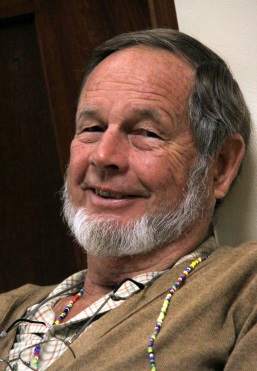
JOHN W. BERRY, is Professor Emeritus of Psychology at Queen's University, Canada, and Senior Research Fellow, National Research University Higher School of Economics, Moscow, Russia.
He graduated (BA) from Sir George Williams University (Montreal) in 1963, and from the University of Edinburgh (PhD, 1966). He received Honorary Doctorates from the University of Athens, and Université de Geneve (in 2001).
He lives in the Thousand Islands (Kingston, Canada, summer) and the British Virgin Islands (winter). He has published over 40 books in the areas of cross- cultural, intercultural, social and cognitive psychology with various colleagues. He is a Fellow of: the Canadian Psychological Association, the International Academy for Intercultural Research, the International Association for Cross-cultural Psychology, and the International Association of Applied Psychology.
Most recent books are:
Sam, D.L. & Berry, J.W. (eds) (2016). Cambridge handbook of acculturation psychology, 2nd edition). Cambridge: Cambridge University Press
Sam & Berry (eds) (2016). Cross- cultural psychology (4 volumes). London: Routledge
Mishra & Berry (2017). Ecology, culture and human development: Lessons for Adivasi education. New Delhi: Sage
Berry (ed.) (2017) Mutual intercultural relations. Cambridge: Cambridge University Press
Lebedeva, Dimitrova & Berry (eds) (2018) Value and identity change in post-communist societies. Berlin: Springer
Berry (2019). Acculturation: A personal journey across cultures. Cambridge: Cambridge University Press
Podcast 02: Overcoming the canvas ceiling – Refugee employment by Eun Su Lee, Selena Choo, and Betina Szkudlarek
About the podcast
As refugees attempt to rebuild their lives in their new home counties, employment constitutes one of the critical steps in their social, cultural and economic integration. Yet, in their quest for employment, refugees need to overcome a complex set of barriers. In this podcast, we introduce the concept of the canvas ceiling defined as a form of systemic marginalization that cuts across multiple levels (institutional, organizational and individual levels), and that prevents refugees from gaining meaningful employment and professional advancement. We discuss how both employers and individuals can support refugees integrate into workplaces, overcoming the canvas ceiling.
Publications
Lee, E. S., Szkudlarek, B., Nguyen, D. C., & Nardon, L. (2020). Unveiling canvas ceiling: A multidisciplinary literature review and research agenda of refugee employment and workforce integration, International Journal of Management Reviews, 22(2), 193-216.
Nardon, L., Zhang, H., Szkudlarek, B., & Gulanowski, D. (2020). Identity work in refugee workforce integration: The role of newcomer support organizations. Human Relations. In-press
Roy, P. A., Szkudlarek, B., & Caprar, D. V. (2020). Refugees and Cross-Cultural Management Studies. In B. Szkdularek, L. Romani, D. V. Caprar, & J. Osland (Eds.), The SAGE handbook of contemporary cross-cultural management (Ch. 30). Sage Publications.
Szkudlarek, B. (2019). Engaging business in refugee employment: the employer's perspective. (https://ses.library.usyd.edu.au/bitstream/handle/2123/21513/Engaging%20business%20in%20refugee%20employment.pdf?sequence=2)
Szkudlarek, B., Nardon, L., Osland, J., Adler, N., & Lee, E. S. (2019). When context matters: What happens to international theory when researchers study refugees. Academy of Management Perspectives. In-press.
Websites
Humans Like Us (www.HumansLikeUs.org)
Tent Partnership for Refugees (www.Tent.org)
About the presenters
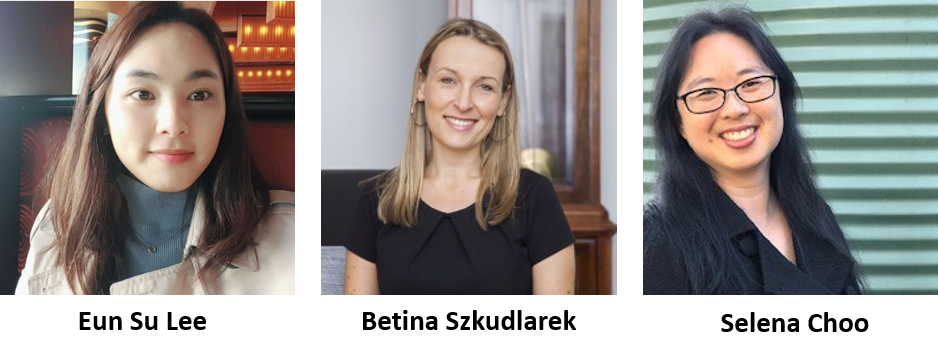
Eun Su Lee, University of Sydney Business School, Student Member of IAIR (
Eun Su (Jeannie) Lee is a PhD candidate in the discipline of International Business. Prior to her candidature, she worked in human resources management and corporate management for Australian companies in the mining and construction industries. Her research interest areas include Global Mobility and International Human Resource Management. Jeannie's recent research appears in Academy of Management Perspectives and International Journal of Management Reviews.
Selena Choo, Founder of Humans Like Us (HumansLikeUs.org)
Selena founded Humans Like Us in 2019 to connect people supporting refugees in their working life, to each other. She is the backbone for the Australian Employer Network for Refugee Inclusion, a group of companies passionate about welcoming refugees as colleagues, who are working together to amplify their efforts.
Betina Szkudlarek, University of Sydney Business School, Member of IAIR (
Betina Szkudlarek is an Associate Professor at the University of Sydney Business School. Betina’s core research interests lie at the intersection of cross-cultural management, international HRM, and management of diversity. Betina has worked with numerous multinational corporations and not-for-profits on fostering global leadership excellence. Beyond her academic commitments, Betina holds the post of a Strategic Sustainability and Growth Consultant with the United Nations Alliance of Civilizations (UNAOC).
Podcast 03: How East Asians Raise Students Who Excel by Cornelius Grove
About the podcast
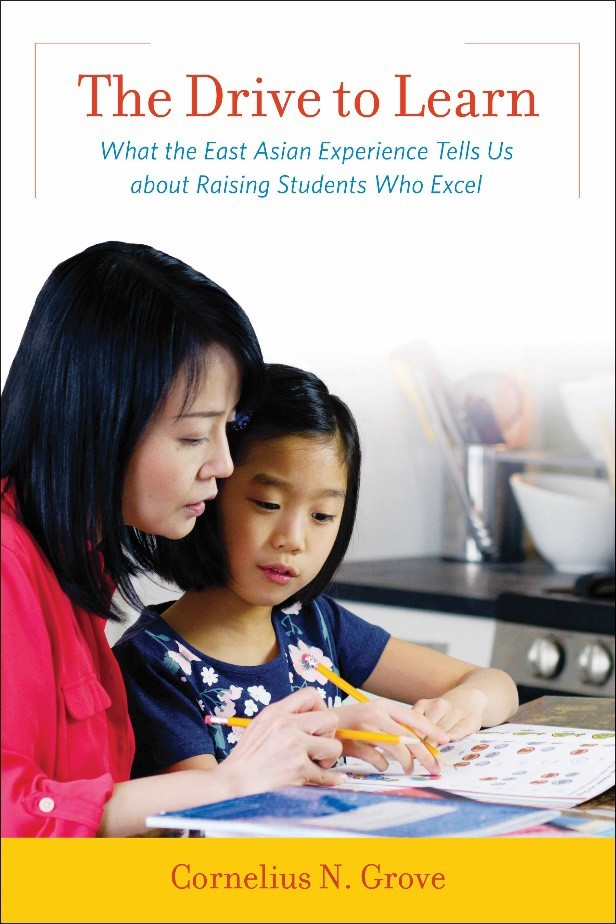 The 30-minute podcast How East Asians RAISE Students Who Excel offers highlights of Cornelius Grove’s 2017 book, pictured here.
The 30-minute podcast How East Asians RAISE Students Who Excel offers highlights of Cornelius Grove’s 2017 book, pictured here.
After reading dozens of the roughly 1,000 research reports from scholars who, since 1970, have been seeking explanations for the superior academic performance of East Asian students, Grove concluded that children there are “more receptive to classroom learning” than their American peers, and that they bring this receptiveness to school from their homes. But why?
Further exploring the research literature, Grove concluded that communitarian cultures such as those of East Asia tend to value child-rearing strategies that promote children’s receptiveness to learning from elders (even siblings) by means of both direct instruction and observation/imitation. Thus, children arrive at the schoolhouse door on Day One with expectations that differ from those of children raised in individualistic cultures.
Grove concludes by noting some of the strategies and activities that are characteristic of East Asian parents, and that differ in many respects from the practices typical of American parents.
About the presenter

Cornelius N. Grove, Ed.D., is an independent scholar based in New York. In the past, he has held teaching posts at Columbia University, New School University, and Beijing Foreign Studies University. Since 1990, Dr. Grove has served as the managing partner of the global business consulting firm GROVEWELL LLC.
Dr. Grove’s mission since 2005 has been to explain the cultural and historical reasons for American children’s comparatively mediocre academic performance. His books The Aptitude Myth (2013) and The Drive to Learn (2017) are now followed by A Mirror for Americans (2020), each published by Rowman & Littlefield. He’s the author of encyclopedia entries on pedagogy across cultures (Sage 2015 and Wiley-Blackwell 2017), and coauthor of Encountering the Chinese (Brealey, 3rd Ed., 2010).
Available on ResearchGate are many of Grove’s articles on (a) the impact of national cultural values on children’s learning, and (b) global business leadership.
His complete professional biography (including a link to his personal bibliography) is readily available at Grovewell.com/our-two-partners.
Also listen to this podcast’s “sister podcast,” How East Asians TEACH Students Who Excel
Podcast 04: How East Asians Teach Students Who Excel by Cornelius Grove
About the podcast
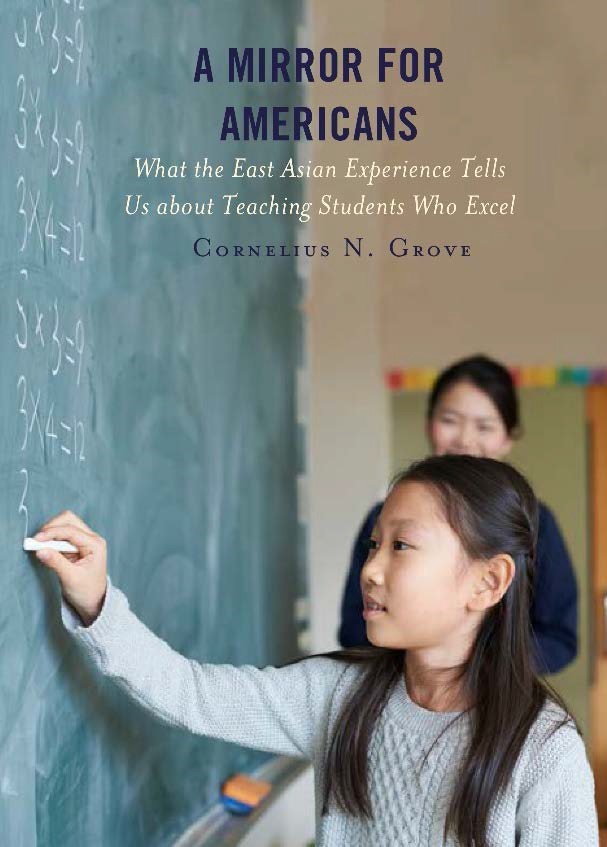 The 30-minute podcast How East Asians TEACH Students Who Excel offers highlights of Cornelius Grove’s 2020 book, pictured here.
The 30-minute podcast How East Asians TEACH Students Who Excel offers highlights of Cornelius Grove’s 2020 book, pictured here.
After reading dozens of the roughly 1,000 research reports from scholars who, since 1970, have been seeking explanations for the superior academic performance of East Asian students, Grove realized that academic lessons in primary schools there are characterized by sustained focus on the knowledge to be learned, to an extent that’s rare in American schools. How so?
Through his perusal of the research, Grove identified 12 patterns that distinguish formal learning in East Asian primary schools. Three examples: In preschool the children are taught, and they practice, how to support a teacher’s efficient lesson delivery. Teachers are more securely grounded in their academic field than their American peers. And lesson design is driven by the logic of the content being taught, not by individual pupils’ needs.
Grove notes that while Americans debate student-centered vs. teacher-centered classrooms, knowledge-centered classrooms in East Asia are ensuring their children’s academic prowess.
About the presenter

Cornelius N. Grove, Ed.D., is an independent scholar based in New York. In the past, he has held teaching posts at Columbia University, New School University, and Beijing Foreign Studies University. Since 1990, Dr. Grove has served as the managing partner of the global business consulting firm GROVEWELL LLC.
Dr. Grove’s mission since 2005 has been to explain the cultural and historical reasons for American children’s comparatively mediocre academic performance. His books The Aptitude Myth (2013) and The Drive to Learn (2017) are now followed by A Mirror for Americans (2020), each published by Rowman & Littlefield. He’s the author of encyclopedia entries on pedagogy across cultures (Sage 2015 and Wiley-Blackwell 2017), and coauthor of Encountering the Chinese (Brealey, 3rd Ed., 2010).
Available on ResearchGate are many of Grove’s articles on (a) the impact of national cultural values on children’s learning, and (b) global business leadership.
His complete professional biography (including a link to his personal bibliography) is readily available at Grovewell.com/our-two-partners.
Also listen to this podcast’s “sister podcast,” How East Asians RAISE Students Who Excel
Podcast 05: The psychological contract of integration by Inga Jasinskaja-Lahti
About the podcast
For decades, social relations in the context of migration have been studied with a focus on intergroup contact as a means to promote positive intergroup relations, particularly immigrant integration. In my talk, I suggest looking at social relations in the context of immigration through the concept of psychological contract (PC) between minority and majority group members regarding the terms and conditions of an exchange agreement of mutual respect and integration. The acts of violation of this contract are monitored by the officials and both parties of the contract (i.e. minority and majority group members). The violation of psychological contract could be evidenced in discrimination perceived by minority group members or disloyalty towards the receiving society as perceived by the majority group members. Our research shows the detrimental effects of perceived psychological contract violation (PCV) on immigrants’ psychological and social well-being and national identification, but also on intergroup trust and attitudes among both minority and majority group members towards each other. Moreover, while perceived PCV can mobilise immigrants to confront injustice, it seems to hamper majority group’s willingness to support immigrants in their attempts to achieve recognition and social mobility.
About the presenter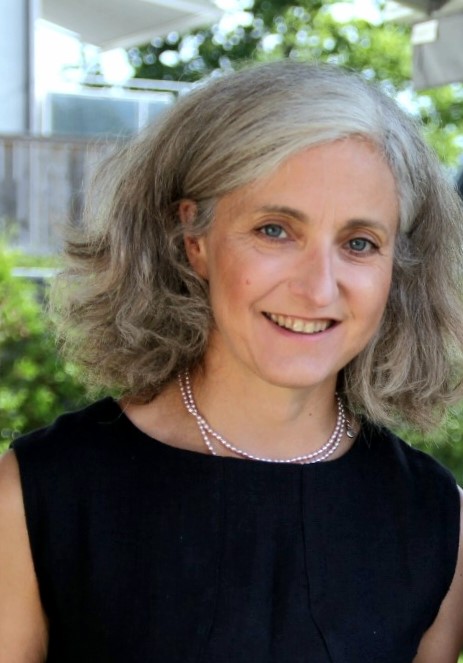
Podcast 07: The bright and the dark side of shame - Transforming shame in cultural contexts by Claude-Hélène Mayer and Elisabeth Vanderheiden
About the podcast
This podcast deals with one of the most intriguing emotions: shame. Shame is an emotion that is often hidden and at the same time the cause for many other emotions that we experience. The speakers explore in their talk the dark side and the bright side of shame in different cultural contexts and from various perspectives. While in some cultures shame seems to be a taboo subject that is negatively costed, often repressed, in other cultures it is almost considered a virtue. Shame, viewed from the stance of different cultures and disciplines, has often been associated with psychopathological concepts, self-condemnation and regulating social interaction in which a person or a group has violated a moral or social code. It is, however, argued in this podcast that shame can be transformed from a positive psychology viewpoint. It can therefore even turn into a health-resource.
About the presenters
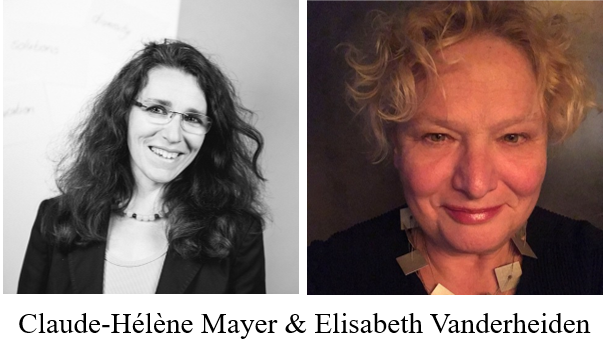
Mayer, Claude-Hélène, (Dr. habil., PhD, PhD) is a Professor in Industrial and Organisational Psychology at the Department of Industrial Psychology and People Management at the University of Johannesburg, an Adjunct Professor at the European University Viadrina in Frankfurt (Oder), Germany and a Senior Research Associate at Rhodes University, Grahamstown, South Africa. She holds a Ph.D. in Psychology (University of Pretoria, South Africa), a Ph.D. in Management (Rhodes University, South Africa), a Doctorate (Georg-August University, Germany) in Political Sciences (socio-cultural anthropology and intercultural didactics), and a Habilitation (European University Viadrina, Germany) in Psychology with focus on work, organizational, and cultural psychology. Her research areas are: mental health, salutogenesis, shame and culture, existentialist positive psychology, women in leadership, and psychobiography.
Elisabeth Vanderheiden is a pedagogue, theologian, intercultural mediator. She is the CEO of the Global Institute for Transcultural Research and the President of the Catholic Adult Education of Germany. Her latest publications focused on shame as resource as well as mistakes, errors and failure and their hidden potentials in the context of culture and positive psychology 1.0 and 2.0. In a current project she investigates life crises and their individual coping strategies from different cultural viewpoints.
Elisabeth Vanderheiden and Claude-Hélène Mayer are editors of the trilogy of books on shame, published by Springer, Cham, Switzerland: “The value of shame”, The bright side of shame” and the third book that will soon be published “Shame 4.0”.
Podcast 08: Shades of multiculturalism by David Sam
About the podcast
Defining multiculturalism as “a policy with its attending practices regarding the coexistence of many ethnocultural groups in a plural society, as well as the normative beliefs that characterize how the relationships should be among the groups” (Sam. 2017); this podcast elaborates on the concept. The podcast identifies five shades of multiculturalism, four of which are embedded in the definition, namely “co-existence”; “normative beliefs”; “policy” and “practices”. More specifically, the definition touches on (1) multiculturalism as a demographic reality involving the living together of different ethnocultural groups; (2) multiculturalism as beliefs and attitudes toward how the relationships among people of different cultural backgrounds; (3) as a policy on how to accommodate and manage the different ethnocultural groups within the society, and (4) how the policy on multiculturalism is enacted or practiced in reality. The fifth shade, multiculturalism as counter-hegemony, not captured in the definition, refers to efforts made to counter the Eurocentrism and racism that are found in many Western social democratic societies. Under multiculturalism as governance, the podcast highlights what the notion of “multiculturalism has failed” really means.
About the presenter
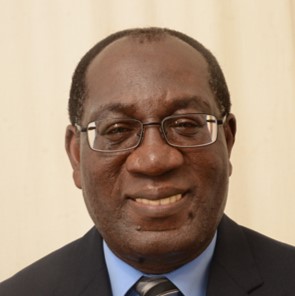
David Lackland SAM (PhD) is a professor of cross-cultural psychology at the University of Bergen in Norway. Sam is a first-generation Ghanaian Norwegian who migrated to Norway soon after his Bachelor degree degree in psychology at the University of Ghana. He became a faculty member at the University of Bergen, soon after his PhD, at the same university. Sam currently divides his faculty position between the Department of Psychosocial Science (Faculty of Psychology) and the Department of Global Public Health and Primary Care (Faculty of Medicine). Sam also has adjunct positions at the University of Ghana, and the Chicago School of Professional Psychology, USA. Sam has been a visiting professor at several universities in Australia, Canada, Finland, Germany, and the United States. Sam teaches courses on culture and psychology, and his main research interest is how culture influences human behavior, and how behavior is expressed in different cultural societies. Sam has researched into how immigrants adjust to another society. His research work was first on international students, then to young immigrants in Norway. He has also looked at immigrants comparatively in countries such as USA, Australia, Canada, Germany, France, Sweden, and the United Kingdom. In addition, he has done research on several topical issues from a comparative position. He is currently planning a study on how people are adjusting to the new normal in the face of corona in different countries. Sam has published extensively, both in international journals and textbooks. His 2016 book: The Cambridge handbook of acculturation psychology, received the 2017-Outstanding book award from the International Academy for Intercultural Research. His latest book, a 4-volume Cross-cultural psychology anthology, was published in 2018.
Podcast 09: What Does It Take to Become 'One of Us'? National Identity and Inclusion (Part One) by Adam Komisarof
About the podcast
Migrants around the world exceeded 271 million in 2019—a figure that has almost doubled since the 153 million reported in 1990 (International Organization for Migration, 2020). Migration presents an exigent sociopolitical challenge in the contemporary globalized world, both in terms of how nation-states manage this ever-increasing phenomenon as well as how individuals respond to it—either as migrants themselves or as members of their receiving community. Consequently, every society at this point in time faces an exigent question: Do we choose an inclusive, evolving national identity that embraces new groups crossing our borders or opt for an exclusive one that thwarts acceptance of people who fall outside of a narrowly defined ethnocultural group of co-nationals?
The purpose of this podcast is to share conceptual tools for thinking about how national identity is formed, maintained, and utilized both to include and exclude migrants. Some of the topics covered are the meaning and benefits of belonging, types of national identity, and how national identity can vary within the same country and even the same person. Additionally, Dr. Komisarof explains how national identity can be made broader and hence more inclusive of groups who often find themselves on society’s margins.
This podcast is designed both for researchers as well as members of the general public who are interested in issues of migration and how people create and maintain national boundaries and identities.
About the presenter
Adam Komisarof is a Professor of Intercultural Communication and Acculturation in Keio University's Faculty of Letters in Tokyo, Japan. Dr. Komisarof spent a sabbatical at the University of Oxford (2012-13), where he served as a Senior Associate Member of St. Antony’s College and conducted research as a Visiting Academic at the Nissan Institute of Japanese Studies. He is the author of two books and editor of one, most recently Crossing Boundaries and Weaving Intercultural Work, Life, and Scholarship in Globalizing Universities (Routledge, with Prof. Zhu Hua), as well as the award-winning On the Front Lines of Forging a Global Society: Japanese and American Coworkers in Japan (Reitaku University Press). His many publications include book chapters such as “Acculturation in East and Southeast Asia” in The Cambridge Handbook of Acculturation Psychology, 2nd edition (Cambridge University Press, with Chan Hoong-Leong) and academic journal papers including “Constructing Who Is Japanese: A Study of Social Markers of Acceptance in Japan” in Wiley’s Asian Journal of Social Psychology (with Chan-Hoong Leong and Eugene Teng). He was also the co-editor of a special issue in 2020 of the International Journal of Intercultural Relations (Elsevier) entitled “Viewing Intercultural Adaptation and Social Inclusion Through Constructs of National Identity” (with Chan-Hoong Leong). Professor Komisarof is a Fellow and President-Elect of the International Academy for Intercultural Research.
Podcast 10: “What does it take to become “One of Us”? How Recipient Culture Shapes National Identity and Inclusion (Part Two) by Chan-Hoong Leong
About the podcast
Globalisation and transnational movement of labour have made intercultural contact an omnipresent feature of our demographic landscape. But in-spite of this development in the human history, our social world has also shrunk considerably in recent years due to increasing economic uncertainty and a rise in right-leaning politics. The barriers to immigrant inclusion are now more stringent, as members of receiving societies redefine the boundaries of national identity and inclusion using a more calibrated lens. Recipient nationals expect immigrants to conform to selected socio-behavioural characteristics before embracing them as a member of the national ingroup. In short, it is more challenging now for immigrants to become naturalised as “one of us”. This podcast will take listeners through the contemporary representation of national identity (ethnic vs civic), follow by recent development in this field of research using social markers of acceptance as benchmark of inclusion. Lastly, I will introduce concepts of culture-general and culture-specific identity markers, and discuss how the cultural contours in the receiving societies shape the type of social markers endorsed, and what it means to national identity representation and diversity management.
References
Komisarof, A., & Leong, C.H. (2020). Viewing intercultural adaptation and social inclusion through constructs of national identity: An introduction. International Journal of Intercultural Relations, 78, 1-9.
Leong, C.H. (2014). Social Markers of Acculturation: A New Research Framework on International Adaptation. International Journal of Intercultural Relations, 38(1), 120-132.
Leong, C.H. Komisarof, A., Dandy, J., Jasinskaja-Lahti, I., Safdar, S., Hanke, K., & Teng, E. (2020). What does it take to become “one of us?” Redefining ethnic-civic citizenship using markers of everyday nationhood. International Journal of Intercultural Relations, 78 10-19.
Komisarof, A., Leong, C.H., & Teng, E. (2020). Constructing Who Is Japanese: A Study of Social Markers of Acculturation in Japan. Asian Journal of Social Psychology, 23(2), 238-250.
About the presenter
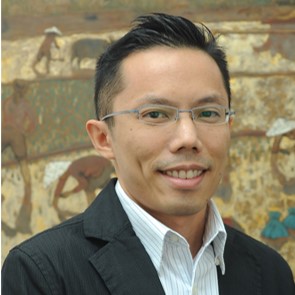
A/Prof Chan-Hoong Leong, Centre for Applied Research, Singapore University of Social Sciences
Chan-Hoong Leong is Associate Professor at the Centre for Applied Research the at Singapore University of Social Sciences. He received his PhD (psychology) from Victoria University of Wellington, New Zealand, and MSc’s in Statistics (2011) and Applied GIS (2019) from the National University of Singapore. Chan-Hoong was Principal Investigator for various government commissioned surveys such as the State of the Overseas Singaporeans Survey (2017), Youth Study on Transitions and Evolving Pathways in Singapore (2017), and the Geo-spatial Study on How Social and Built Environment Impacts Attitudes to Immigrants (2018). He is a Fellow and Board Member of the International Academy for Intercultural Research, and is currently an Editorial Board member for the Asian Journal of Social Psychology. He was Consulting Editor for the International Journal of Intercultural Relations, IJIR (2013–2014), and Guest Editor for the 2013 and 2020 IJIR Special Issues, “Multiculturalism: Beyond Ethnocultural Diversity and Contestations”, and “Viewing intercultural adaptation and social inclusion through constructs of national identity”, respectively.
Podcast 12: Managing Multiple Cultural Identities by Colleen Ward
About the podcast
Can Mai-Lin be both Chinese and Kiwi (Chiwi)? Can Jose balance his “Hispanic” and “American” selves? Our evolving programme of research has shown that immigrants and minority group members negotiate their cultural identities in two key ways: 1) blending identities by selectively choosing desirable elements from their ethnic and national cultures and combining them in a novel way and 2) alternating cultural identities depending on the circumstances. Our findings have further shown that these blending (hybridizing) and alternating identity styles have implications both for cultural identity and for psychological well-being. It’s not just a question of maintaining dual cultural identities (integrating) for positive outcomes- it is HOW these identities are managed that matters. Learn more about our research findings in our 15 minute podcast on Managing Multiple Cultural Identities.
Related Readings
Stuart, J., & Ward, C. (2011). A question of balance: Exploring acculturation, integration and adaptation of Muslim immigrant youth. Journal of Psychosocial Intervention. 20 (3) 255-267.
Ward, C., Ng Tseng-Wong, C., Szabo, A., Qumseya, T., & Bhowon, U. (2018). Hybrid and alternating identity styles as strategies for managing multicultural identities. Journal of Cross-cultural Psychology, 49, 1402-1439.
Schwartz, S. J., Meca, A., Ward, C., Szabó, A., Benet-Martínez, V., Lorenzo-Blanco, E. I., Albert Sznitman, G., Cobb, C. L., Szapocznik, J., Unger, J. B., Cano, M. A., Stuart, J., & Zamboanga, B. L. (2019). Biculturalism dynamics: A daily diary study of bicultural identity and psychosocial functioning. Journal of Applied Developmental Psychology, 62, 26-37.
Szabo, A., Ward, C., Meca, A., & Schwartz, S. (2020). Testing the construct validity and empirical distinctiveness of the Multicultural Identity Styles Scale (MISS) and the Bicultural Identity Integration Scale (BIIS-2). Psychological Assessment, 32(7), 705-712.
Ward, C., Szabó, Á., Schwartz, S. J., & Meca, A. (forthcoming). Acculturative stress and cultural identity styles as predictors of psychosocial functioning in Hispanic Americans. International Journal of Intercultural Relations.
About the presenter

Colleen Ward (PhD, FRSNZ) is a Professor of Cross-cultural Psychology and Founding Director of the Centre for Applied Cross-cultural Research at Victoria University of Wellington, New Zealand. She received her PhD in 1977 from University of Durham (UK) and has held research and teaching positions at the University of the West Indies (Trinidad), Science University of Malaysia, National University of Singapore, and University of Canterbury prior to her current appointment. Her primary research interests are acculturation and intercultural relations as described in her co-authored book The Psychology of Culture Shock (and in many of her more than 180 journal papers and book chapters. Colleen is passionate about translational science and has used her research as the basis of consultancy and policy advice to government and her work with NGOs. She was awarded the Royal Society of New Zealand’s Te Rangi Hiroa Medal for her outstanding contributions to the advancement of the psychological study of immigration, acculturation and is featured in 150 Women in 150 Words for the celebration of the Royal Society’s 150th anniversary (2017). Colleen is past President of the International Academy for Intercultural Relations (2009-11); former Editor in Chief of the International Journal of Intercultural Relations (2012-4); and current President of the International Association for Cross-cultural Psychology.
Podcast 13: What the Arts Can (and Can’t) Communicate Across Cultures by Stephen Fox
About the podcast
Humanity shares arts across cultures, in visual, theatrical, literary, and musical formats. Because arts are products of our culturally mediated affective, behavioral, and cognitive processes, arts express, reinforce, and perpetuate our cultural belief systems and norms. This podcast introduces avenues by which arts may reveal psychological components of cultures and provide opportunities to increase intercultural understanding. These aspects include emotional expression, social structures, cultural learning, and self-concept. Specific examples are included, illustrating Hofstede’s (1980) cultural dimensions of Power Distance and Individualism in classical music practices of India, Pakistan, and the United States, along with traditional music of Ituri rainforest pygmies in Central Africa. Recorded musical examples are examined to illustrate the Hofstede dimensions and explicate the cultural differences in musical characteristics and ensemble structure in those cultures..
About the presenter

Stephen Fox, PhD: Fox holds a Doctorate in Cross-Cultural Psychology from Victoria University of Wellington New Zealand and an MA in Community and Cultural Psychology from the University of Hawaii at Manoa. These followed a BA in Music from Manoa, emphasizing composition and ethnomusicology. His ongoing research studies how participation in traditional ethnocultural arts such as hula, taiko drumming, and kapa haka affects psychological well-being. He designs and evaluates grant-funded cultural programs and lectures in the University of Hawaii system, where he also advises in the Institute of Hawaiian Music. He is the author of the SAGE Publications textbook Culture and Psychology (Fox, 2020), which incorporates his multidisciplinary approaches into the book’s pedagogy. Dr. Fox also is a performing musician and composer with multiple film and television credits..
Podcast 14: The Intercultural Doors of Perception by Milton Bennett
About the podcast
William Blake wrote that the partially closed doors of perception limit our vision of reality, and Aldous Huxley expanded on the metaphor by writing about how one could pass through psychedelic doors into an enhanced experience of reality. This podcast focuses on the relationship of perception and experience through a kind of autobiographical trip with the speaker through some of his own explorations of the topic. On the way, there is discussion of physics, poetry, psychology, linguistics, and more interdisciplinary academic action. The result is a model of forming and feeling that lets us think of intercultural communication as an exercise of self-reflexive consciousness. As Carlo Rovelli says, the future is rushing towards us a cloud of possibility, and it is through our interaction with those probabilities that the actuality of a new present is created. We need to be doing that more intentionally.
About the presenter

Milton J. Bennett is a founding fellow of IAIR. He graduated from the first dedicated Ph.D. program in intercultural communication (University of Minnesota, Minneapolis) with a dissertation on a theory of perception, communication and consciousness. He also holds an MA from San Francisco State University in Language Arts (psycholinguistics and general semantics) and studied physics at Stanford University (BA, creative writing). In his first (and last) tenured academic position at Portland State University, he taught the course “Communication and Consciousness” for many years, along with directing the intercultural graduate program. He moved from academia into training and consulting work through the Intercultural Communication Institute, which he co-founded in Portland, Oregon. For the last 20 years he has returned to more academic work through directing the Intercultural Development Research Institute (www.idrinstitute.org) in the US and Europe. He continues his active publication of academic articles, chapters, and books, including his text Basic Concepts of Intercultural Communication: Paradigms, Principles, and Practices that is translated into Chinese and Italian

